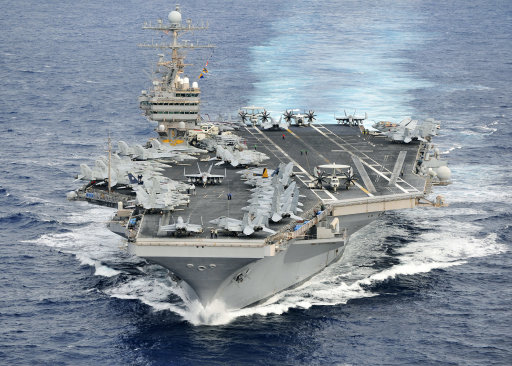Iran Warns U.S. Against Sending Aircraft Carrier Back to Gulf
Iran will block oil shipments through the Strait of Hormuz if sanctions are imposed on its crude exports, as the U.S. and European Union have threatened, the state-run Islamic Republic News Agency said on Dec. 27, citing Vice President Mohammad Reza Rahimi.
The head of Iran’s army warned the U.S. against sending an aircraft carrier back to the Persian Gulf after it passed through the Strait of Hormuz a week ago.
“We usually don’t repeat our warning, and we warn only once,” Ataollah Salehi was cited as saying by the state-run Fars news agency. “We recommend and emphasize to the American carrier not to return to the Persian Gulf.”
The USS John C. Stennis, which Iran said it spotted during naval exercises, passed eastward through the Strait of Hormuz on Dec. 27 on a routine voyage and was operating in the northern Arabian Sea, said the U.S. 5th Fleet, which has a base in Bahrain. Salehi spoke today at a ceremony to mark the completion of 10 days of maneuvers by the Iranian navy on the east side of the strait in the Gulf of Oman.
Iran will block oil shipments through the Strait of Hormuz if sanctions are imposed on its crude exports, as the U.S. and European Union have threatened, the state-run Islamic Republic News Agency said on Dec. 27, citing Vice President Mohammad Reza Rahimi. Navy Commander Habibollah Sayyari said the blockage would be “easy,” according to the country’s Press TV.
About 15.5 million barrels of oil a day, or a sixth of global consumption, passes through the Strait of Hormuz between Iran and Oman at the mouth of the Persian Gulf, according to the U.S. Energy Department.
The U.S. Navy said Dec. 28 that it won’t tolerate a disruption to shipping in the strait.
Iran, the world’s third-largest oil exporter, is facing new trade restrictions aimed at halting what the U.S. and allies say is a plan to build nuclear weapons. Iran says its atomic program is for peaceful purposes.
Inspectors from the International Atomic Energy Agency are expected to visit Iran soon, the Fars news agency cited Foreign Ministry spokesman Ramin Mehmanparast as saying in Tehran today.
Iran will block oil shipments through the Strait of Hormuz if sanctions are imposed on its crude exports, as the U.S. and European Union have threatened, the state-run Islamic Republic News Agency said on Dec. 27, citing Vice President Mohammad Reza Rahimi.
The head of Iran’s army warned the U.S. against sending an aircraft carrier back to the Persian Gulf after it passed through the Strait of Hormuz a week ago.
“We usually don’t repeat our warning, and we warn only once,” Ataollah Salehi was cited as saying by the state-run Fars news agency. “We recommend and emphasize to the American carrier not to return to the Persian Gulf.”
The USS John C. Stennis, which Iran said it spotted during naval exercises, passed eastward through the Strait of Hormuz on Dec. 27 on a routine voyage and was operating in the northern Arabian Sea, said the U.S. 5th Fleet, which has a base in Bahrain. Salehi spoke today at a ceremony to mark the completion of 10 days of maneuvers by the Iranian navy on the east side of the strait in the Gulf of Oman.
Iran will block oil shipments through the Strait of Hormuz if sanctions are imposed on its crude exports, as the U.S. and European Union have threatened, the state-run Islamic Republic News Agency said on Dec. 27, citing Vice President Mohammad Reza Rahimi. Navy Commander Habibollah Sayyari said the blockage would be “easy,” according to the country’s Press TV.
About 15.5 million barrels of oil a day, or a sixth of global consumption, passes through the Strait of Hormuz between Iran and Oman at the mouth of the Persian Gulf, according to the U.S. Energy Department.
The U.S. Navy said Dec. 28 that it won’t tolerate a disruption to shipping in the strait.
Iran, the world’s third-largest oil exporter, is facing new trade restrictions aimed at halting what the U.S. and allies say is a plan to build nuclear weapons. Iran says its atomic program is for peaceful purposes.
Inspectors from the International Atomic Energy Agency are expected to visit Iran soon, the Fars news agency cited Foreign Ministry spokesman Ramin Mehmanparast as saying in Tehran today.

